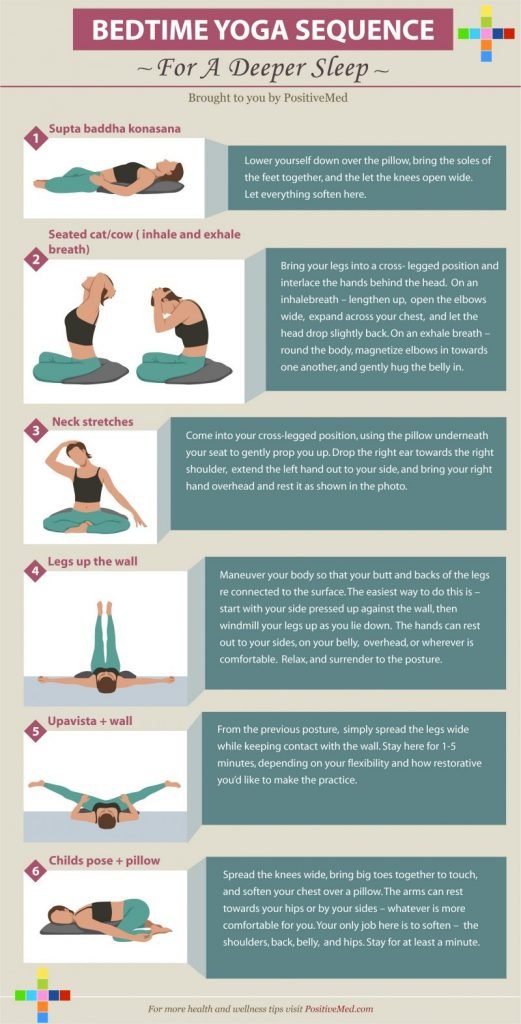
You can keep your toes tucked under or release them so the tops of the feet are on the mat. Relax your shoulders and allow your chest to drop toward the mat. If your forehead doesn’t touch the mat, you can slide a block or pillow beneath your forehead or you can rest your chin on the mat. Allow your arms to lengthen until you feel a stretching sensation in the underside of your arms into your armpits. and then walk your hands about a foot forward and a little wider than your shoulders. If you like, place a folded blanket beneath your knees. This pose targets the meridians of the arms, including the heart meridian, which is especially involved with calming the mind. If the heart is weak or agitated, it disturbs the mind, causing sleep problems. That’s because the heart is seen as the “house” of the mind, or spirit. Why this pose will help you sleep: Difficulty sleeping is connected to a heart imbalance in Chinese medicine. See also: 15 Yoga Poses to Help You Sleep Better Puppy (Anahatasana) Breathe easily as you remain in these stretches. In addition to incorporating some yin into your evening, don’t forget to tamp down any yang elements in your evening, whether it’s an intense workout, a heated conversation, or an unresolved issues from work or school. This sequence of stretches for sleep is designed to enhance your yin energy and cool your yang aspects to promote a proper night of rest. Yet the underlying theory upon which Yin is based posits that there is another sort of release that allows blocked energy to circulate. These not-too-intense, longer-held stretches bring profound release and physical benefits in terms of enhancing flexibility. It seeks to address energy along the meridians, which are believed to be situated in our connective tissue. Yin Yoga is largely based on the same principle. Acupuncture is one approach to this, in which needles are placed in specific points on meridians to balance energy excesses or deficiencies. Not being able to sleep is considered an imbalance in Chinese medicine, which addresses the energy meridians and seeks to balance the body’s energy by tonifying or unblocking your qi. See also: Why Yin Yoga Could Be the Refresher Your Practice Needs How can Yin Yoga help with insomnia? These lines of energy need to be open and balanced in order for us to remain in balance.

Traditional Chinese Medicine works with the principle that your energy, or q i, flows through lines, or meridians, throughout the body. One very common symptom of imbalance between yin and yang is insomnia or poor sleep, which is something you are likely to experience when you have too much yang energy or too little yin energy. We simply need to be curious about these symptoms, rather than ignore them, so we can start to understand the underlying cause. And when things get out of whack, there’s a greater likelihood of things slipping in our health. When yin and yang energy in our lives are in balance, Chinese medicine posits, we’re healthy. What do yin and yang have to do with sleep? Something that is inherently yin is in relationship to something else that is either more or less yin, and relates the principle underlying Chinese medicine. Yin manifests as the water element and tends to be more yielding and surrendering. Generally speaking, things that are yin tend to be dark, hidden, cool, subtle, and still. Yang manifests as the fire element and is about making things happen. Things that are yang tend to be bright, loud, hot, direct, and active. See also: These Yin Yoga Poses Will Feel Sooo Good on Your Lower Back What (exactly) is yin and yang?Īccording to Traditional Chinese Medicine (TCM), everything in the universe has yin and yang qualities. If that’s the case, Yin Yoga can help you get better sleep. Or perhaps what’s at fault with your insomnia isn’t something you did but rather something that you didn’t do-balance your yin and yang energies. Or the backbend you did at yoga class earlier in the evening. You could blame that double espresso you had after lunch.

It’s as if the more we attempt to doze off, the more elusive sleep becomes. We all know what it’s like to lie awake in bed at an indecent hour and try to will ourselves to sleep. Heading out the door? Read this article on the new Outside+ app available now on iOS devices for members!


 0 kommentar(er)
0 kommentar(er)
